预备词组6AModule1Unit2
牛津沪教版六年级上6AUnit1-Unit2重要知识点复习
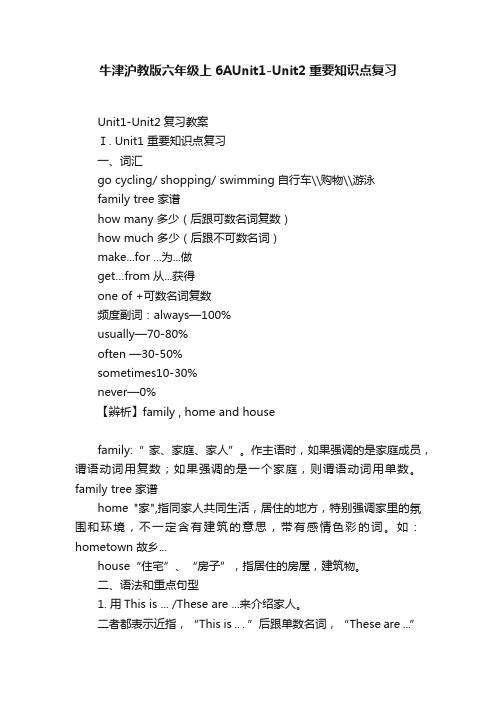
牛津沪教版六年级上6AUnit1-Unit2重要知识点复习Unit1-Unit2复习教案Ⅰ. Unit1 重要知识点复习一、词汇go cycling/ shopping/ swimming自行车\\购物\\游泳family tree 家谱how many 多少(后跟可数名词复数)how much 多少(后跟不可数名词)make...for ...为...做get…from从...获得one of +可数名词复数频度副词:always—100%usually—70-80%often —30-50%sometimes10-30%never—0%【辨析】family , home and housefamily:“ 家、家庭、家人”。
作主语时,如果强调的是家庭成员,谓语动词用复数;如果强调的是一个家庭,则谓语动词用单数。
family tree 家谱home "家",指同家人共同生活,居住的地方,特别强调家里的氛围和环境,不一定含有建筑的意思,带有感情色彩的词。
如:hometown 故乡...house“住宅”、“房子”,指居住的房屋,建筑物。
二、语法和重点句型1. 用This is ... /These are ...来介绍家人。
二者都表示近指,“This is .. . ”后跟单数名词,“These are ...”后跟复数名词或者多个不同的对象。
2.用how many 来询问数量后接可数名词的复数形式,当我们提问你有多少……时候,如果How many后跟人,常用how many... do you have?如果How many 后跟物,常用how many...have you got?3.What do you do with your... ? 和What else do you do with your... ? 来提问与家庭成员或亲戚一起做什么.else 意为别的其他的,常用于特殊疑问词或不定式之后,如what else, something else等。
牛津沪教版六年级上6AUnit1-Unit2 重要知识点复习
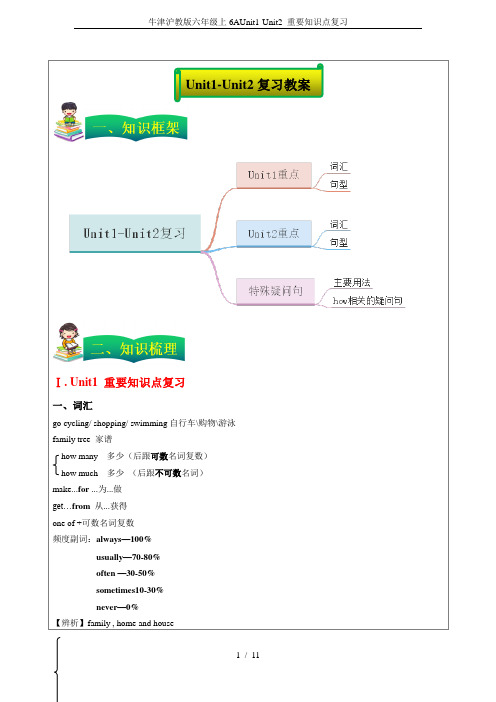
Unit1-Unit2复习教案Ⅰ. Unit1 重要知识点复习一、词汇go cycling/ shopping/ swimming自行车\购物\游泳family tree 家谱how many 多少(后跟可数名词复数)how much 多少(后跟不可数名词)make...for ...为...做get…from从...获得one of +可数名词复数频度副词:always—100%usually—70-80%often —30-50%sometimes10-30%never—0%【辨析】family , home and housefamily:“ 家、家庭、家人”。
作主语时,如果强调的是家庭成员,谓语动词用复数;如果强调的是一个家庭,则谓语动词用单数。
family tree 家谱home "家",指同家人共同生活,居住的地方,特别强调家里的氛围和环境,不一定含有建筑的意思,带有感情色彩的词。
如:hometown 故乡...house“住宅”、“房子”,指居住的房屋,建筑物。
二、语法和重点句型1. 用This is ... /These are ...来介绍家人。
二者都表示近指,“This is .. . ”后跟单数名词,“These are ...” 后跟复数名词或者多个不同的对象。
2.用how many 来询问数量后接可数名词的复数形式,当我们提问你有多少……时候,如果How many后跟人,常用how many... do you have?如果How many 后跟物,常用how many...have you got?3.What do you do with your... ? 和What else do you do with your... ? 来提问与家庭成员或亲戚一起做什么.else 意为别的其他的,常用于特殊疑问词或不定式之后,如what else, something else等。
沪教版牛津小学英语6A-Module1-Unit2-period1
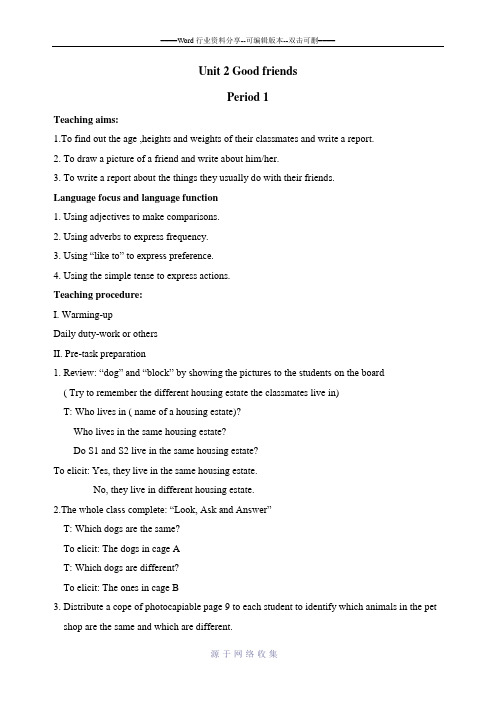
Unit 2 Good friendsPeriod 1Teaching aims:1.To find out the age ,heights and weights of their classmates and write a report.2. To draw a picture of a friend and write about him/her.3. To write a report about the things they usually do with their friends.Language focus and language function1. Using adjectives to make comparisons.2. Using adverbs to express frequency.3. Using “like to” to express preference.4. Using the simple tense to express actions.Teaching procedure:I. Warming-upDaily duty-work or othersII. Pre-task preparation1. Review: “dog” and “block” by showing the pictures to the students on the board( Try to remember the different housing estate the classmates live in)T: Who lives in ( name of a housing estate)?Who lives in the same housing estate?Do S1 and S2 live in the same housing estate?To elicit: Yes, they live in the same housing estate.No, they live in different housing estate.2.The whole class complete: “Look, Ask and Answer”T: Which dogs are the same?To elicit: The dogs in cage AT: Which dogs are different?To elicit: The ones in cage B3. Distribute a cope of photocapiable page 9 to each student to identify which animals in the pet shop are the same and which are different.III. While-task procedure1. Play the recording: Look and Read Students listen and follow in their books.2. Play the recording again Students listen and repeat3. Give the students a few minutes to read the passage silently.4. Ask the students to read the five sentences in Answer True/false.5. Tell the students to close their booksT: Who is your good friend?How old is he/she?What do you like to do together?To elicit: _________is my good friend. He /She is _______ yeas old. We always /usually /sometimes ________ together.6. Distribute a copy of Photocopiable page 10 to each student to tick the things they and theirfriends do together. Then they write them in complete sentencesIV. Consolidation:Grammar practice Book A Page 4-5.。
沪教版小学牛津英语6A Module1Unit2

●
gets angry
1 2 3 4 5 6 7 8
Listen and write
Alice is my good friend. She is always friendly _______ andhelpful ______. works She always______ hard She is never ____. late for school. ______ never She ______ gets angry. Kitty is my good friend. kind She is always ________ to others. She always shares her _______ with food me. She is never naughty ________. She never tells lies ___________.
8-5 John likes reading English books . ● He likes English very much and he always gets 取得) (取得)an A in English tests(测试 测试). 测试 ● Do you want to be his friend? ● Why or why not?
●
works hard
1 2 3 4 5 6 7 8
8-6 Jim always plays games and doesn’t work hard at school. ● He usually goes to school very late(晚). 晚 ● Do you like to be his friend? ● Why or why not?
Module 1 Unit 2词组及句子

Module 1 Unit 2 Our animals friends词组及句子1.visit sp = see sp 参观某地2.welcome to sp 欢迎来到某地3.leave sb / sth 离开(遗弃) 某人/物4.leave sp 离开某地5.leave for sp 出发去某地6.leave A for B 离开A地去B地7.in / on the street /road 在路上8.take sb to sp 带某人去某地9.bring sb to sp 带某人来某地10.keep sb /sth 收留某人/ 饲养某物11.prefer A to B = like A better than B 比起B来更喜欢A12.give sb sth / sth to sb 给某人某物13.dog food for puppies / little dogs 适合小狗吃的狗粮14.hold sb / sth carefully 小心翼翼地托起某人/物15.take sb for a walk 带某人去散步16.need (to) do sth 需要干某事17.need sth 需要某物18.buy sb sth / sth for sb 给某人买某物19.be unkind to sb 对某人不友善20.be kind /friendly to sb 对某人友善的21.save sb from sth 挽救某人免于发生某事22.save sb from danger 挽救某人免于发生危险23.prevent sb (from) doing sth 预防(妨碍)某人干某事24.help sb (to) do sth 帮助某人干某事25.help sb with sth 在某事上帮助某人26.promise to do sth 发誓干某事27.sick animals 生病的动物28.ask sb to do sth 要求某人干某事29.make a display 做一个展示30.make sb sth / sth for sb 为某人制作某物31.keep sb from sth = protect sb from sth 保护某人免于遭受某事32.keep sb from doing sth 阻止某人干某事33.keep sb away from sth 使某人远离某事34.play with sb / sth 与某人/ 物玩35.in many (different) ways 在许多(不同)方面36.cross the road = walk across the road 穿过马路37.bring sth to sp 把某物带来某地38.blind people 盲人39.missing people 失踪的人40.on the farm 在农场上41.I’m an SPCA officer. 我是爱护动物协会的工作人员。
外研版-英语-六年级上册-6A Module1 Unit2教案(第2课时)
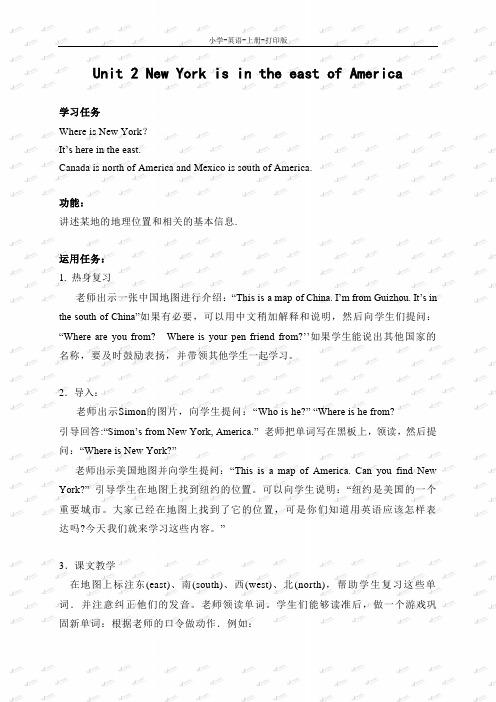
Unit 2 New York is in the east of America学习任务Where is New York?It’s here in the east.Canada is north of America and Mexico is south of America.功能:讲述某地的地理位置和相关的基本信息.运用任务:1. 热身复习老师出示一张中国地图进行介绍:“This is a map of China. I’m from Guizhou. It’s in the south of China”如果有必要,可以用中文稍加解释和说明,然后向学生们提问:“Where are you from? Where is your pen friend from?’’如果学生能说出其他国家的名称,要及时鼓励表扬,并带领其他学生一起学习。
2.导入:老师出示Simon的图片,向学生提问:“Who is he?”“Where is he from?引导回答:“Simon’s from New York, America.” 老师把单词写在黑板上,领读,然后提问:“Where is New York?”老师出示美国地图并向学生提问:“This is a map of America. Can you find New York?” 引导学生在地图上找到纽约的位置。
可以向学生说明:“纽约是美国的一个重要城市。
大家已经在地图上找到了它的位置,可是你们知道用英语应该怎样表达吗?今天我们就来学习这些内容。
”3.课文教学在地图上标注东(east)、南(south)、西(west)、北(north),帮助学生复习这些单词.并注意纠正他们的发音。
老师领读单词。
学生们能够读准后,做一个游戏巩固新单词:根据老师的口令做动作.例如:Please turn to the north.Please turn to the south.Please turn to the east.Please turn to the west.老师随意发出口令,学生要尽快执行口令。
6A Module 1 Unit 2 Good friends

What kind of person is a friend?
warm-hearted always help others have difficulties like to do things with you give you much fun share good things with you understand you
Rose Garden School Name:Alice Wang Age:11years 5 months Height:127cm Weight:30kg Rose Garden School Name:Kitty Li Age:11 years 4 months Height:130cm Weight:29kg
( F ) Alice and Kitty live in the same flat. ( T ) Alice and Kitty live in the same housing estate. T ) Alive and Kitty are friends. ( ( T ) They usually go to school together. ( F ) They never play together after school.
A proverb(谚语)
A friend in need (需要) is a friend indeed.(真正的)
ห้องสมุดไป่ตู้
Danny is the tallest of the three. Alice is the shortest of the three. Danny is the heaviest of the three. Kitty is the thinnest of the three. Danny is the oldest of the three. Kitty is the youngest of the three.
六年级上册英语-Module1 Unit2 It's in the west.外研版【三起】

六年级上册英语-Module1 Unit2 It’s in the west.外研版(三起)单元概述本单元主要包含学习方位介词“in”、“on”、“under”和“next to”的用法,能够描述事物的具体位置及方位。
通过学习本单元,学生能掌握以下词汇和句型:•Where is it?•It’s in/on/under/next to the…•north/south/east/west•left/right•Go straight on. Turn left/right.同时,学生在学习英语的过程中也能够提高对方向的认识,增强自己的空间感知能力。
词汇学习本单元的重点词汇主要包括:•It - pron. 它•north - n. 北方•south - n. 南方•east - n. 东方•west - n. 西方•left - adj. 左边的;adv. 向左•right - adj. 右边的;adv. 向右•next to - prep. 紧挨着,旁边的•in - prep. 在…里面•on - prep. 在…上面•under - prep. 在…下面学生可以通过反复朗读、默写练习来掌握这些单词的正确拼写和发音。
语言结构学习1.句型结构:“Where is it?” “It’s in/on/under/next to the…”在询问事物具体位置的情境下,学生需要掌握以“What”、“Where”等疑问词引导的疑问句及其回答。
并学习方位介词“in”、“on”、“under”和“next to”的用法,掌握这些介词在不同情境下的用法和语法结构,以便能够准确地表述事物的位置和方位。
2.句型结构:“Go straight on. Turn left/right.”在引导别人前往目的地的情境下,学生需要掌握如何表达方向指引。
这类句子中要使用动词 Go, Turn, Walk, Drive 等,以及方向介词 On, In, At 等来表达方向。
6A Module1 Unit2 知识点梳理

Module 1 Unit2 知识点梳理二.词形1. puppy (复数) puppies2. have / has (过去式) had3. the same (反义词) different4. block (近义词) building5. always (反义词) never6. often (近义词) usually7. after 之后(反义词) before 8. ones (单数) one 9. black (反义词) white 10. younger (反义词) older 11. it (形物代) its 12. their (宾格) them13. heavy (比较级) heavier 14. thin (比较级) thinner 15. fat (比较级) fatter16. taller (原级) tall 17. shorter (原级) short 18. wait (同音) weight 19. month (复数) months 20. cm (完整) centimetre 21. kg (完整) kilogramme 22. new (反义词) old 23. cycle (复数) cycles 24. cycle (名词) cycle 25. cycle (动名词) cycling 26. fourteenth (基数词) fourteen 27. nine (序数词) ninth 28. were (单数) was 29. am / is (过去式) was 30. are (过去式) were三. 固定表达1.together 和with的用法1)together 一般放在动词或动词短语的后面,意思是“一同,一起”2)当with翻译成“和……”时,位于动词和(人/事物)之间,意思或用法与together 相近3)多数情况下,together 和with 不在同一个句子中重复使用例:Kitty and Alice play together after school. (用with 改写)注:主语是Kitty and Alice, 两个人,是复数,所以用动词原形play 改写:Kitty plays with Alice after school.注:主语是Kitty,一个人,是单数,所以用三单plays2.play一词的用法1) 当翻译成“玩……”时,一般用play with ~~~ 例:玩球play with a ball2) 不翻译成“玩……”时,play 后面就不能跟介词with例:play football ( play “踢” ) play the piano ( play “演奏”)3.问年龄、身高、体重的方法1)年龄How old is……? = What is one’s age?2) 身高How tall is /are …? = What’s one’s height?注:询问婴儿的身高:用How long is (was) / are (were) the baby?3) 体重How heavy is /are …? = What’s one’s weight? = How much do / does … weigh?4)注:one’s 指的是形容词性物主代词, 意思是“~~~的”4.“喜欢做某事”like doing something = like to do something注:doing是指动词ing形式,do是指动词原形5.“地址”的表达方式1)Flat 2B ,其中:“2”代表the second floor,即2楼,“B”代表公寓门牌号2)地址表达,遵循从小到大的顺序例:上海淮海路玫瑰花园小区3幢5楼A室Flat 5A, Rose Garden Estate, Huaihai Road, Shanghai City6.both 和all\的用法1)both 指“两者都……”, 后面跟可数名词的复数形式,例:both puppies2)all 指“三者或三者以上都…… / 所有的…都…”, 一般用all the +可数名词的复数形式例:all the housing estates。
6A Module 1 Unit 2 school rules

on time 准时 = at the right time in time 及时 = early enough Do the train run on time? 火车准时开吗? We must get there in time to get a good seat. 我们必须及时到那去找个好位子。
absent adj.
缺席的 -------n. absence
be absent from 缺席 He is absent from the meeting. be late for 迟到
Go to school early. Don’t be late for class.
I’m sorry. I’m late for school.
CLASS IS OVER
Goodbye everybody
We can read books.
We must hand in our homework.
We mustn’t play.
We mustn’t do the homework in the morning . We can’t copy others’ homework.
We mustn’t talk with each other in class.
We shouldn’t/mustn’t play something in the desk. We shoul
We mustn’t eat or drink in class.
We should/must listen to our teachers carefully. We should/must answer questions actively. We should write down what is important. We can ask teachers what we don’t understand.
牛津6A配套课件Module 1 Unit 2 Period 5 (ok)

Module 1
Family and friends
Unit 2
I have a good friend
5
Piggy Bank
Read the rhyme Look and learn
Think and answer
Reame
Clean Environment We are kids of Shanghai So stop polluting our city cause we love it So let’s be neat and keep it clean, So let’s look after our environment. Every step I take, Every move I make, To look after our city ... Shanghai is our hometown So let’s join hands together To keep our city green And make our life better.
I promise to reuse shopping bags.
I promise not to pollute the air.
预备第一学期期中期末词组句型复习

预备年级6A 期中、期末词组、句型复习Module 1 Relationships Unit 1 Meet my familyP2 1. parents son daughter2. can, may, must3. look (at), see, watch, read4. This is……These are……5. live in the same flat live in different blocks6. Ben’s, Peter’s, Teachers’ Day, May and Mary’s, May’s and Mary’s (whose) five minutes’ walk (how far)7. Rose Garden Estate8. How old are you? Which grade are you in?9. How many people are there in your family?10. talk about (say, speak, tell, talk)P3 1.Ben is young, but I’m younger.== I’m younger than Ben. Ben is older than me.Y our dog is small, but mine is smaller.==My dog is smaller than yours. Y our dog is bigger than mine.P4 1. How many people are there in your family?How much milk is there in the bottle?2. I also have two older brothers. (also, too)3. older brothers, younger sisters4. 一般过去时5. what to do, where to go, how to answer the questions6. give me the book == give the book to me7. buy me a cake== buy a cake for me8. It’s time for bed. == It’s time to go to bed.P5 1. Nice to meet you. Nice to meet you, too.2. How do you do? How do you do?P6. 1. never, sometimes, often, usually, always (sometime, some time, some times)2. 一般现在时3. with my mum4. play football, play the piano, play with their dogs5. go to the beachP7 1. puppy----puppies2. They are both eleven years old.3. go to school together (play together after school)4. Its name is Sam. I t’s brown.P8 1. Danny is taller than Alice and Kitty.==Danny is the tallest of the three.2. height (cm)3. weight (kg )4. age (years old)P9 1. walk to school together == go to school on foot together2. help each other like each other3. share our lunch/ sweets4. at the weekend at weekends5. on weekdays6. watch televisionP10 1. from Flat 2B2. like to skate and cycle== like skating and cycling (like to do sth, like doing sth)3. how about you ==what about you (How about going for a picnic?)4. like to dress up5. just like me (look like his father)6. all of you (all, both)P11 1. It’s a holiday tomorrow.2. 一般将来时3. What do you want to do? (want to do sth == would like to do sth)4. What are you going to do?(be going to do sth)5. see visit (They are going to visit the Space Museum..)6. a fountain, a swimming pool, a bird aviary, pitchP12 1. How are we going to get to City Park? (get to school, get there, get home, get here) 2. We are going to take a bus to school.== We are going to school by bus. (train, plane, ferry, tram, taxi)P13. 1. go to the aviary quickly (提问用How)2. be quiet walk in quietly (区别quite, quiet quiet, quietly )3. swim slowly, fly quickly, sing loudly4. look for something to eat5. 现在进行时P14 1. bring, take2. It has soft hair.3. I’m sorry Excuse me4. How much is the dog?5. It’s too dear.6. I haven’ t enough money. ( I haven’t got enough money.)7. Are you going anywhere?8. What’s the weather like today? == How is the weather today?9. in the morning on Monday morning at six o’clockP17. 1. What job do you do? What job does Peter’s mother do?What’s Peter’s mother? What’s Peter’s mother’s job? (job, work)2. What’s that woman? Who’s that woman?3. What do you usually do? What does he usually do?4. fireman, astronaut, pilot, farmer, doctor, shop assistant, cook, fisherman, waiter, nurse, policeman, policewoman (a woman teacher, women teachers)5. drive a fire-engine6. put out fires like to help people7. a pilot an astronaut8. sell things to people bring food to people cook food for people9. safe (be safe, a safe place, feel safe) get home safelyP20 want to be a doctor want to make sick people betterP22 1. live on the ninth floor (which floor do you live on? On which floor do you live?)2. live in Block 2 (which block do you live in?)3. first, second, third, fourth, fifth, eighth, ninth, twelfth, twentieth, twenty-first4. It is the top floor.5. tennis courtsP23 1. 最高级the tallest (youngest, thinnest, best)2. 介词(in, on, at, under, above, before, after, in front of, behind, beside, between, on the right, on the left) 区别:His book is on the desk.. The book on the desk is his.P24 1. What’s your address?(I live at Flat 2B, Block 1.)2. What’s your telephone number? (double, zero)P25 1. kitchen, chicken2. big, bigger, the biggestP27. 1. be crowded with traffic2. a busy street (busy 反义词free)3. a lot of== lots of a lot of people lots of traffic4. move along slowly5.P28. 1. some, any 的用法2. Can you see any……? Y es, I can see……3. Did you see any……? Y es, I saw……P29 1. at half past seven2. the nearest station3. get on, get off, get into, get off Here we are. Let’s get off the bus. Here comesthe bus. Let’s get on.4. for ten minutes (How long) ten minutes’ walk (How often )at ten o’clock (What time, when)5. Once, twice (How many times) once a week (How often )6. at Prince Station at the bus stop7. Simon’s journey to schoolP30 1. How do you go to school? I go to school by bus.2. I take a bus to school. = I go to school by bus.3. by bus then on foot then by undergroundP31 1. wait on the pavement2. look left and right and left again3. at the traffic lights4. Walk quickly!== Y ou can walk quickly!5. Don’t run!== Y ou can’t run!6. cross the road go across the road walk across the zebra crossing7. on our way to school on my way homeP32 1. wrong right2. Is it wrong or right?P33. 1.Y ou can do……== Do……!2. Y ou can’t do……== Don’t ……!3. No buses! No bicycles!P34 1. I’m never late. (He’s never late, is he?)2. near (not far from)3. move into a housing estate4. Why are you late? (I am late because ……)5. show…round…… (show …….around)P37. 1. What do we need? What do we need to buy?2. We need some tea. We don’t need any coffee.3. Is there any……? Are there any……?4. Here you are.P38 可数名词和不可数名词P39 peaches, steak, fish, frozen food, dairy products, milk, tomatoes, potatoes, lettuces, onions, snacks, rice, noodles, special offer, section, vegetables,P41 1. a small carton of milk, a large can of meat2. How much did you spend? She spent ______ yuan.P42 1. make pancakes2. I like apples best. == Apples are my favourite fruit. == My favourite fruit is apples.3. What food do you like? What food do you like best?P44. 1. breakfast, lunch, dinner (supper)2. What do you usually have for breakfast? I usually have bread for breakfast.3. What’s your favourite food for breakfast? Bread! That’s my favourite food for breakfast.P45 1. yesterday, today, tomorrow2. Sunday, Monday, Tuesday, Wednesday, Thursday, Friday, Saturday3. What are you going to eat/ have for dinner today?4. I’m going to eat/ have fish for dinner today.5. What did you eat/ have for lunch yesterday?6. I ate/ had soup for lunch yesterday.P46 1. What are you eating?2. Have you ever eaten hot-dogs? Y es, I have. They’re nice.3. Have you ever eaten steak? No, I haven’t. I don’t like steak.期末总复习P47 Good food, bad food (food)1.We can jump. (情态动词)2.work hard at school work hard at English (study hard----studies)3.healthy ---- a healthy diet keep healthy be healthy He is healthier than before.health---- V egetables are good for our health.unhealthy----It is an unhealthy diet.4. a lot of, lots of, plenty of, some, any, many, muchWould you like ____ coffee? We should eat ________ vegetables.5. a little, little, a few, fewHurry up, ther e’s _____ time left. Don’t worry, there’s ______ time left.There are _____ eggs in the fridge, let’s go and buy some.6.We can’t run _____ jump. He has no brothers ____ sisters.There is no air _____ water on the moon.7.too many, too much, too little, not enoughA bad diet is not enough vegetables. He _____have _____vegetables, he is unhealthy.8.be good for, be bad for Eating many vegetables is good for us. Smoking is bad for us.be good at He is a good cook.==He is good at cooking. (be good at== do well in)9.背单词:fruit, vegetables, cheese, yoghurt, tired, sweets, crisps, hamburger, soft drinksP48. 1. What is a good diet? A good diet is……2. every day everyday3. Sunday, Monday, Tuesday, Wednesday, Thursday, Friday, Saturday4. What have you eaten this week? I have eaten ……(现在完成时)P49 1. What is a bad diet? A bad diet is……2. What do you think of the film? == Hoe do you like the film?3. There is/ are There was/ were There is going to be/ There are going to beP50 1. I went to the fridge. I opened the door. (一般过去时)2. on the shelf (shelves)3. seven slices of ham, four pieces of cheese, three cartons of milk, a bowl of fruitP51. Sausages are good for us. Fish is good for us.P52. 1. make sandwiches for lunch, make a sandwich for me2. another piece of bread (one…the other, one…another, some…the others, some…others)3. on topP53. Food from other countries (country----countries)1. Japan----Japanese China----Chinese England----English America----American Britain----British Australia----Australian Canada----Canadian France----FrenchHe is from _____. He is a ________.2. What are you buying? I am buying some fruit. (现在进行时)3. come from== be from Where do they come from?==Where is it from?==P54 1. dear, dearer, the dearest cheap, cheaper, the cheapest2. The apples from Canada are cheaper. The ones from New Zealand are cheaper.3. The butter from Thailand is dear. The butter from New Zealand is dearer.4. expensive, more expensive, the most expensiveP55 How much does she spend? She spends 50 yuan (on the food). Spend…on…pay…for…sth cost sb money. It takes sb some time to do sth.P56 1. Our mum is a good cook.== Our mum is good at cooking.2. like doing == like to do sth (enjoy doing sth) would like to do sth3.help sb to do sth help sb do sth help sb with sth4. go shopping together (go swimming/ skating/ skiing/ boating)5. peel the carrots lay the table wash the dishes6. I have made a cake. (a sandwich, salad)P60 1. get ready for a picnic2. Let’s have a picnic tomorrow. Great.3.get some things ready get something ready4.What do we need? What do we need to buy?5.There isn’t any milk or juice.== There is no milk or juice.6. all right==Ok That’s all right.==That’s OK.7. a menu for breakfast8. I’m hungry. Me too.9. read the menu 10. Chicken is my favourite food.== I like chicken best.11.Do you want some prawns? Can I have some lemonade?P61 Garden city and its neighbours (neighbourhood, neighbour)1.spring, summer, autumn, winter (in spring, on Sunday, on a cold morning, in themorning, at night, on the night of May 1st)2.The weather is good. What’s the weather like today? How is the weather today?3.It’s sunny but not too hot.4.visit the Space Museum (Where are you going to visit? )5.visit the Buddha on Lucky Island (luck----lucky----luckily----unlucky----unluckily)6.18 Fir Tree Road, V ictoria, Canada7.write to Tom (write a letter to Tom) hear from Tom (收到某人的来信)P62 1. the rest the others2. except besides3. in a leap year at half past six at six thirty at ten twenty at twenty past ten4.The visit is going to end at 1:50 p.m. (when) at one fifty at ten to two5. When are you going to visit the museum? We are going to visit the museum at 11:00 a.m.(一般将来时)P63. 1. east, west, south, north, compass, The compass needle always points north.2. a photograph of Hong Kong a map of China3. an astronaut a uniform an uncle4. take the picture from space in the sky5. north of Hong Kong Island (south of, west of, east of)6. in the east of, on the east of, to the east of, around Hong Kong Island7. There are no big islands east of Hong Kong Island.== There are not any big islands east of ……P65. 1. holidays (the summer holidays, the winter holidays)2. a holiday brochure a hotel stay at a 4-star hotel (an eight-year-old girl)3.see the mountains see the fishermen go on a river trip a beautiful city4.fly to Beijing fly on China Eastern to Guilin5.The Wangs are looking at holiday brochures.6.at Chinese New Y ear How will you get there? We will get there by plane. (we won’t)7.How long will you stay there? We will stay there for three days.8.stay on the boat stay with relativesP67 1. the weather forecast for Chinese New Y ear (the weather report)2. Guilin will be cold. (warm, cool, hot, wet, dry, sunny, cloudy, windy, rainy, snowy)3. It will be colder than Xi’an.4. What will we wear when we get there? (wear put on)5. warm enough cool enough quickly enough slowly enough6. hat, coat, scarf (scarves), sandals, socks, glovesP681. a hundred yuan (two hundred students, two hundred of the students, hundreds of students) thousand, million2. I’ll get the tickets. (get==buy) the tickets for the football match3. How much do you need? I need you r help. (I don’t need your help) I needn’t finish it now.4. I’ve only got 100 yuan. ( only)5. Y ou haven’t got enough money. (enough time, money, vegetables, clothes……)6. Here you are. Here’s your change. Here we are. Let’s get off the bus.8.Are you wearing enough clothes?9.go on a boat trip, 30 yuan per personP69 Festivals in China1.January, February, March, April, May, June, July, August, September, October, November,December2.buy new clothes and special food3.thousands of people hundreds of students millions of people4.The New Y ear decorations are beautiful.5.visit their families and relatives6.give money to the children (give sb sth give sth to sb) (make sb sth make sth for sb)7.the first day of Chinese New Y ear (first, second, third, fifth, ninth, twelfth, twentieth )8.have a special dinnerP70. Which festival do you like better?1.Soon it will be Dragon Boat Festival. Watch Dragon Boat racesntern Festival Mid-autumn Festival Christmas3.Which festival do you like (best)?Which festival is your favourite?P71. 1. a piece paper, some paper a newspaper2. coloured pencils felt pens paints and brushes a pair of scissors glue3. trace (复制) Cut out the shapes carefully.4.stick the shapes on the large piece of paper5.make a patternP73 1. sports activity (activities) entertainment2. Swimming is my favourite sport. (sailing sewing collecting ……)3. I can play tennis. What do you like to do? I like to play tennis. I like playing tennis.4. at the weekend at weekends5. Is that a sport? Y es, it is. No, it isn’t.P76 1. What have you done today? I have written a letter.2. Have you done your homework? Y es, I have. No, I haven’t.3. 现在完成时P78 1. What do you do at Chinese New Y ear?/ on New Y ear’s Day2. buy presents for children3. There are thousands of people there.4. China must be very beautiful. (must be can’t be may be)5. stay at home stay here for Chinese New Y ear wear new clothes6.spend the festival7.have matches with other classes8.How did you do in the match? We did very well.9.Our class won the game. Tha t’s great.P79 Change growing up1. This was me when I was born. (be born) When and where were you born?2. quite big3. How much did you weigh when you were born? I weighed 3 kilogrammes.4. How long were you when you were born? I was 47 centimetres long.5. How tall were you when you were two years old? I was 87 cm tall.6. How much do you weigh? I don’t know. (== I have no idea.)P80 1. taller shorter longer shorter heavier lighter2. age/years old weight/ weigh long/ length tall/ heightP82 1. a few centimeters tall 2. He wasn’t too small to fight against the rat.3. be brave4. run away from the catP83 1. the weather2. I will take my umbrella when I go out to play.3. make their nest go to the beach lie (lying) under an umbrella fly a kiteP84. 1. Why do you like summer? Because we can go to the beach.2. I like summer better than winter. (== I prefer summer to winter.)3. butterfly butterflies insect have a barbecue make sandcastles make snowmenP85 dangerous ----more dangerous wonderful----more wonderfulBeautiful careful exciting frightening interesting famous modern Happy—happier lucky----luckier healthy----healthierP86 1. I am stronger than you. Y ou are weaker than me.2. How hard I blow! What an interesting story it is!== How interesting the story is!3. make the plants grow make me laugh4.blow off his clothes behind in front of5. put on my scarf /take off my scarf begin to laugh begin to shine It’s your turn.6. have a swim go swimming7. I win!P87. changes in Shanghai1. more than seven hundred years ago hundreds of years ago a moment ago2. Only a few thousand people lived here. Fisherman fishermen farmers3. many tall buildings more than==over (less than)4. do different jobs (office workers, factory workers) build—building—builder(s)5. the History Museum an old village house many other old things6. tell a story (tell me a story) say speak tell talkP88 1. There was no traffic then, but now there is a lot of traffic.2. There were no tall buildings then but now there are a lot of buildings.3. Shanghai was quiet then but now it is busy and noisy.P89. 1. on 5 November in November in 1949 2. come to Shanghai to see you 3. leave----left leave for 4. a photograph of me / of shanghai5. What was Shanghai like fifty years ago? How was Shanghai fifty years ago?6. What does your uncle like? What does your uncle look like? How does your uncle look? What is your uncle like?7. Thank you for your letter.8. a lot of changes the harbour ferry ferries9. not much traffic no trafficP91 How people change1. a baby a young child a child a teenager an adult2. then (at that time)than3.go to secondary school go to kindergarten go to primary school go to work4.slept and ate a lot (a lot a lot of)5.learn to walk learn to talkP95 1. myself yourself himself herself ourselves yourselves themselves2. at different ages (difference)3. the child with a ball in that photo photos4. This photo must be a new one!5. from a baby to a child from a child to a teenager6. Everybody is changing all the time. All the time== always7. in different seasons8. Winter has come. On the beach9. Everybody has his own favourite season.10. We like to do different things in different seasons.。
牛津小学英语6Aunit1,2

Unit 1 Public signs 一词组和日常用语No smoking 禁止吸烟No littering 禁止乱扔杂物No parking 禁止停车Do not touch 禁止触摸Danger!危险No eating or drinking 禁止吃喝keep off the grass 禁止践踏草坪Be quiet 保持安静keep quiet保持安静his cousin 他的表弟on the wall在墙上go in入内a lot of questions许多问题ask sb. some questions about sth.问某人一些有关某事的问题only four years old仅仅四岁a lot of public signs许多公共标志mean different things意味着不同的意思walk on the grass在草地上走make noise发出喧闹的声音know a lot about public signs知道许多有关公共标志的知识the sign on the birds’ cage在鸟笼上的标志climb the tree爬树stay away from the building远离那座建筑物at home在家give me ten yuan给我十元take a walk 散步take photos拍照see something on the grass看见草地上有些东西a ten yuan note一张十元纸币look around看看四周walk to the note走向纸币pick it up 拣起它pick up your pencil拣起你的铅笔come up to him来到他面前a park keeper一个公园管理员point to a sign on the grass指着草地上的一个标志the boy in the green sweater穿着绿色毛衣的男孩shake one’s head摇头on the Internet在网上二.句子1. What does this sign mean? It means ‘No smoking’.It means you shouldn’t smoke.这个标志什么意思?它意味着“禁止吸烟”。
第一模块第二单元重点词组和句子
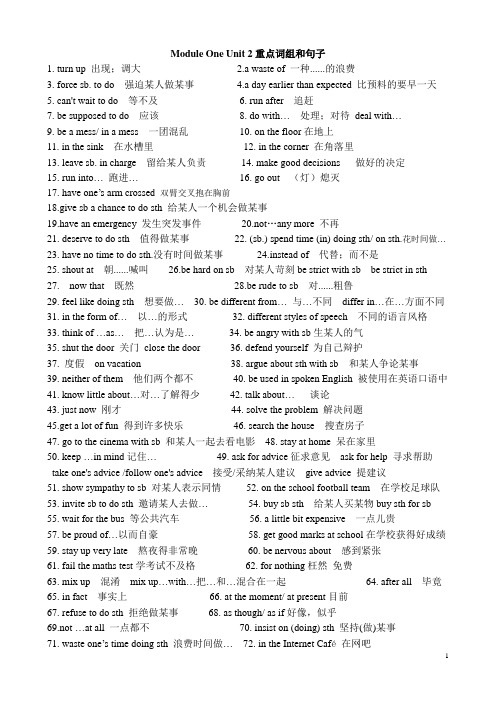
Module One Unit 2重点词组和句子1. turn up 出现;调大2.a waste of 一种......的浪费3. force sb. to do强迫某人做某事4.a day earlier than expected 比预料的要早一天5. can't wait to do等不及6. run after追赶7. be supposed to do应该8. do with…处理;对待deal with…9. be a mess/ in a mess一团混乱10. on the floor在地上11. in the sink 在水槽里12. in the corner 在角落里13. leave sb. in charge留给某人负责14. make good decisions 做好的决定15. run into…跑进…16. go out(灯)熄灭17. have one’s arm crossed 双臂交叉抱在胸前18.give sb a chance to do sth 给某人一个机会做某事19.have an emergency 发生突发事件20.not…any more 不再21. deserve to do sth 值得做某事22. (sb.) spend time (in) doing sth/ on sth.花时间做…23. have no time to do sth.没有时间做某事24.instead of代替;而不是25. shout at朝......喊叫26.be hard on sb对某人苛刻be strict with sb be strict in sth 27. now that既然28.be rude to sb对......粗鲁29. feel like doing sth想要做…30. be different from…与…不同differ in…在…方面不同31. in the form of…以…的形式32. different styles of speech 不同的语言风格33. think of …as…把…认为是…34. be angry with sb生某人的气35. shut the door 关门close the door 36. defend yourself 为自己辩护37. 度假on vacation 38. argue about sth with sb 和某人争论某事39. neither of them 他们两个都不40. be used in spoken English 被使用在英语口语中41. know little about…对…了解得少42. talk about…谈论43. just now 刚才44. solve the problem 解决问题45.get a lot of fun 得到许多快乐46. search the house 搜查房子47. go to the cinema with sb 和某人一起去看电影48. stay at home 呆在家里50. keep …in mind记住…49. ask for advice征求意见ask for help 寻求帮助take one's advice /follow one's advice接受/采纳某人建议give advice 提建议51. show sympathy to sb 对某人表示同情52. on the school football team 在学校足球队53. invite sb to do sth 邀请某人去做…54. buy sb sth 给某人买某物buy sth for sb 55. wait for the bus 等公共汽车56. a little bit expensive 一点儿贵57. be proud of…以而自豪58. get good marks at school在学校获得好成绩59. stay up very late 熬夜得非常晚60. be nervous about感到紧张61. fail the maths test学考试不及格62. for nothing枉然免费63. mix up混淆mix up…with…把…和…混合在一起64. after all毕竟65. in fact事实上66. at the moment/ at present目前67. refuse to do sth 拒绝做某事68. as though/ as if好像,似乎69.not …at all 一点都不70. insist on (doing) sth 坚持(做)某事71. waste one’s time doing sth 浪费时间做…72. in the Internet Café在网吧73. either…or…或者…或者…要么…要么…neither…nor…既不…也不…74. prevent sb (from) doing sth阻止做某事stop sb (from) doing sth keep sb from doing sthforbid sb from doing sth /forbid sb. to do sth.阻止某人做某事75. keep doing sth 不断的做…76. allow sb. to do sth允许某人做某事allow doing sth /allow sb. sth.77. so far 到目前为止78. find fault with…挑毛病79. in reply to one’s letter 作为回某人的信80. depend upon… /depend on…根据依据依靠依赖81. keep up with…赶上跟上82. be prepared to do sth 准备好做什么83. give up 放弃84. a little bit of patience 一点儿耐心85. get along with…和某人相处86. play the piano弹钢琴87. make sb do sth 使某人做某事have sb do sth/ let sb do sth/ get sb to do sth88. do housework 做家务事89. spare time空余时间90. get annoyed 恼火生气91. every time 每次92. send sb. to bed让某人去睡觉93. chat with sb 和某人聊天94. 感到孤独feel lonely be alone 单独一人独自95. go through 经历96. day by day一天天,每天(强调事物的变化) 97. out of control 失去控制98. 现在立刻right now99. along with…和…一起;除了…之外100. be thought of as…被认为是…101. grow to adults 长成大人102. become confused with sth 对…感到困惑103. tend to …往往趋向…104. in this regard 在这方面在这点上105. make good choices 做好的选择106. at the same time 同时107. have difficulty (in) doing sth 做什么有困难108. fit in society 适应社会109. in the end最后110. turn out 结果111. be traded for…用作交换112. on the wal l of the classroom在教室的墙上113. be surprised by…对…感到惊讶114. sth. happen to sb 某事发生在某人身上115. pull one's leg开某人玩笑116. explain sth to sb向某人解释某事explain to sb. sth. 117. get sth done /have sth done 使得某事被做118. all the time一直.总119. make a difference有影响120. be busy with sth/ be busy doing sth. 忙于(做)某事121. choose…from 从…中选择122. even if即使123. mean to打算做124. run out of用完125. score a goal进球得分126. leave out遗漏127. tidy up/ clean up清理128. Shame on you! 为你感到丢脸129. have a talk with sb 和某人谈话130. feel distant 感觉疏远重点句型1.Do you have to turn up(调大)your music so loud? 你是不是非得把音乐放这么大声?2.I can’t wait to surprise the boys. 我迫不及待地要给儿子们一个惊喜.3. Eric runs in after it, followed by a big dog.埃里克随后跑进起居室,跟着一条大狗,走路慢吞吞的.4. You weren’t supposed to (本应该)come home until tomorrow. 你们应该明天才到家的呀!5.The money for dog food is gone. 买狗食的钱不见了.6.What did you do with (处理)the cash we left? 你们用我们留下的钱做什么了?7.The room is in a mess. 起居室里一片狼藉.8. In the corner, there is a garbage can around which are pieces of garbage and waste paper.角落里有垃圾桶,在其周围还有垃圾和废纸。
- 1、下载文档前请自行甄别文档内容的完整性,平台不提供额外的编辑、内容补充、找答案等附加服务。
- 2、"仅部分预览"的文档,不可在线预览部分如存在完整性等问题,可反馈申请退款(可完整预览的文档不适用该条件!)。
- 3、如文档侵犯您的权益,请联系客服反馈,我们会尽快为您处理(人工客服工作时间:9:00-18:30)。
预备年级6A Module One Unit Two
重点:
1. We like to ……together.
He / She is always / never ……
2. Have you been to ……yet ?
Yes,I have already been to ……
Yes,I have already been there.
Yes,I have just been to ……
Yes,I have just been there.
No,I haven’t been to ……yet.
No,I haven’t been there yet.
3. We promise to ……
We promise not to……
词组:
1.talk to sb. 和某人说话
2.not … at all 根本不,完全不
3.don’t talk at all 完全不说话
4.like to play 喜欢玩like doing sth. like to do sth.
5.go to the park 去公园
6.almost every day 几乎每天
7.can’t read or write 不会看书、写字
8.never go out 从不出去
9.at night = in the evening 在晚上
10.like to be together 喜欢在一起
11.walk to school together 一起走路上学go to school on foot together
12.play together 一起玩
13.eat their lunch together 一起吃午餐
14.share their food 分享他们的食物share sth. with sb.
15.help each other 互相帮助
16.help other people 帮助别人help others
17.do morning exercises 做早操,做广播操
18.talk in class 在课上说话
19.go to the library 去图书馆
20.climb trees 爬树
21.friendly and helpful 友爱并热于助人
22.work hard = study hard 学习刻苦
23.be late for school 上学迟到
24.be never late for school 上学从不迟到
25.get angry 生气
26.be kind to others 对别人友善be friendly to sb.
27.be naughty 淘气
28.tell lies 说谎tell a lie
29.never tell lies 从不说谎
30.live in …住在…
31.a visit to sp. 一次去某地的参观;
32.visit + 地方参观某地
33.for the first time 第一次
34.ask sb. about sth. 询问某人关于某事
35.talk about sth. 谈论某事
36.friends of the earth 地球之友
37.look after = take care of 照顾,照看
38.look after the environment 呵护地球
39.all the things round us 我们周围的一切
40.keep the environment clean 保持环境整洁
41.pick up rubbish 捡起垃圾
42.pollute the environment 污染环境
43.air pollution 空气污染,气体污染
44.water pollution 水污染,液体污染
nd pollution 陆地污染
46.put rubbish into rubbish bins 把垃圾扔进垃圾桶
47.tell people to do sth. 告诉人们要做某事
48.tell people not to do sth. 告诉人们不要做某事
49.tell people not to leave rubbish 告诉人们不要乱扔垃圾
50.want to be 想成为
51.promise to do 保证做到
52.promise not to do 保证不做
53.our promises我们的承诺
54.discuss sth. with sb. 和某人一起讨论某事
55.reuse shopping bags 购物袋再利用。
